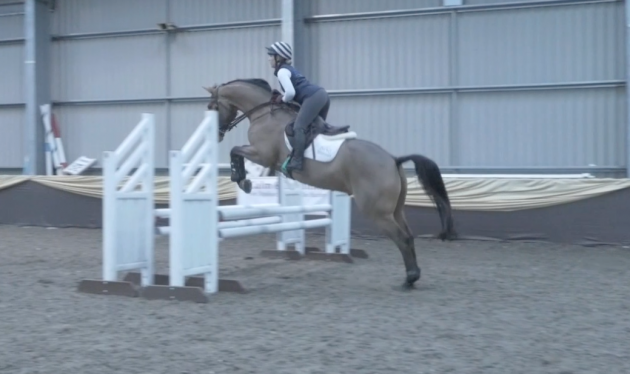H&H catches up with some interesting discussion at the FEI eventing risk management seminar, including looking at the role of various officials on cross-country day in relation to safety
PRAISING riders for good horsemanship is vital for eventing safety to progress, according to leading figures in the sport.
The message came as part of a discussion over officials’ roles on cross-country day at the FEI eventing risk management seminar (23 January).
{"content":"PHA+VGhlIGZvcnVtIHdhcyB0YWtlbiB0aHJvdWdoIGhvdyB0aGUgY291cnNlLWRlc2lnbmVyLCB0ZWNobmljYWwgZGVsZWdhdGUgYW5kIGdyb3VuZCBqdXJ5IHdvcmsgdG9nZXRoZXIgYmVmb3JlLCBkdXJpbmcgYW5kIGF0IHRoZSBlbmQgb2YgY3Jvc3MtY291bnRyeSBkYXksIGFzIHdlbGwgYXMgaG93IHRoZXkgY291bGQgYmUg4oCcYnJhdmVy4oCdIGFib3V0IG1ha2luZyBwcm9hY3RpdmUgZGVjaXNpb25zIGluIGZ1dHVyZS48L3A+CjxwPlRoaXMgc2Vhc29uIHdpbGwgYWxzbyBiZSB0aGUgZmlyc3QgeWVhciB0aGUgY291cnNlLWRlc2lnbmVyIGhhcyBhIG1vcmUgaW52b2x2ZWQgcm9sZSBvbiBjcm9zcy1jb3VudHJ5IGRheSBpbiB0ZXJtcyBvZiB3b3JraW5nIHdpdGggdGhlIHRlY2huaWNhbCBkZWxlZ2F0ZSBhbmQgZ3JvdW5kIGp1cnkgdG8gZGVhbCB3aXRoIGp1ZGdpbmcgcXVlcmllcywgc2FuY3Rpb25zIGFuZCByZXZpZXdpbmcgdGhlIGNvdXJzZSBhbmQvb3Igc3BlY2lmaWMgZmVuY2VzIGluIGNhc2Ugb2YgcmVwZXRpdGl2ZSBmYWxscyBvciB3ZWF0aGVyLXJlbGF0ZWQgdHJvdWJsZS48L3A+CjxwPuKAnFRoZSBtb3N0IGltcG9ydGFudCB0aGluZyB0byByZW1lbWJlciBpcyB0aGF0IHdlIGFyZSByZXNwb25zaWJsZSBmb3IgdGhlIGJlc3QgaW50ZXJlc3RzIG9mIHRoZSBob3JzZSwgdGhlbiB3ZSBhcmUgYWxzbyByZXNwb25zaWJsZSBmb3IgdGhlIGJlc3QgaW50ZXJlc3Qgb2YgdGhlIGF0aGxldGUg4oCTIGFuZCB3ZSBhcmUgcmVzcG9uc2libGUgZm9yIHRoZSBhY3Rpb25zIG9mIGFsbCBvZiB1cyB0b2dldGhlciBhcyBhIHRlYW0s4oCdIHNhaWQgQWxlYyBMb2Nob3JlLCB3aG8gaGFzIGJlZW4gdGVjaG5pY2FsIGRlbGVnYXRlIGF0IHRoZSB3b3JsZOKAmXMgdG9wIGV2ZW50cyBhbmQgc2VuaW9yIGNoYW1waW9uc2hpcHMuPC9wPgo8cD48ZGl2IGNsYXNzPSJhZC1jb250YWluZXIgYWQtY29udGFpbmVyLS1tb2JpbGUiPjxkaXYgaWQ9InBvc3QtaW5saW5lLTIiIGNsYXNzPSJpcGMtYWR2ZXJ0Ij48L2Rpdj48L2Rpdj48c2VjdGlvbiBpZD0iZW1iZWRfY29kZS0zMSIgY2xhc3M9ImhpZGRlbi1tZCBoaWRkZW4tbGcgcy1jb250YWluZXIgc3RpY2t5LWFuY2hvciBoaWRlLXdpZGdldC10aXRsZSB3aWRnZXRfZW1iZWRfY29kZSBwcmVtaXVtX2lubGluZV8yIj48c2VjdGlvbiBjbGFzcz0icy1jb250YWluZXIgbGlzdGluZy0tc2luZ2xlIGxpc3RpbmctLXNpbmdsZS1zaGFyZXRocm91Z2ggaW1hZ2UtYXNwZWN0LWxhbmRzY2FwZSBkZWZhdWx0IHNoYXJldGhyb3VnaC1hZCBzaGFyZXRocm91Z2gtYWQtaGlkZGVuIj4NCiAgPGRpdiBjbGFzcz0icy1jb250YWluZXJfX2lubmVyIj4NCiAgICA8dWw+DQogICAgICA8bGkgaWQ9Im5hdGl2ZS1jb250ZW50LW1vYmlsZSIgY2xhc3M9Imxpc3RpbmctaXRlbSI+DQogICAgICA8L2xpPg0KICAgIDwvdWw+DQogIDwvZGl2Pg0KPC9zZWN0aW9uPjwvc2VjdGlvbj48L3A+CjxwPuKAnEFzIGNsaWNoZSBhcyB0aGF0IG1pZ2h0IHNvbWV0aW1lcyBzb3VuZCwgaXTigJlzIGFic29sdXRlbHkgdHJ1ZS4gVG9nZXRoZXIgd2UgYXJlIGFsbCByZXNwb25zaWJsZSBmb3IgdGhlIGJlc3QgaW50ZXJlc3Qgb2YgdGhlIHNwb3J0LuKAnTwvcD4KPHA+SGUgZW5jb3VyYWdlZCBvZmZpY2lhbHMgdG8g4oCcYmUgYnJhdmVy4oCdIGluIHRha2luZyBhY3Rpb24gYW5kIGFwcGx5aW5nIHNhbmN0aW9ucywgYnV0IGFkZGVkIHRoYXQgaXQgaXMg4oCcYWJzb2x1dGVseSBpbXBvcnRhbnTigJ0gb2ZmaWNpYWxzIOKAnGRvbuKAmXQgb25seSBoYXZlIGEgc3RpY2vigJ0gYnV0IHRoYXQgdGhleSBhbHNvIOKAnGNoYW1waW9uIGFuZCBjb25ncmF0dWxhdGUgZ29vZCBlcXVpbmUgd2VsZmFyZSwgcmlkaW5nIGFuZCBob3JzZW1hbnNoaXAgaW4gd2hhdGV2ZXIgZm9ybSB3ZSBzZWUgaXTigJ0uPC9wPgo8cD7igJxHb29kIGhvcnNlbWFuc2hpcCBpcyBub3QganVzdCB0aGUgZG91YmxlIGNsZWFyIGluc2lkZSB0aGUgdGltZSBvbiBjcm9zcy1jb3VudHJ5IGRheS4gR29vZCBob3JzZW1hbnNoaXAgaXMgdGhlIGd1eSBvciB0aGUgZ2lybCBhdCB0aGUgc2Vjb25kLWxhc3QgZmVuY2Ugd2hvIHB1bGxlZCB0aGVpciBob3JzZSB1cCBiZWNhdXNlIGl0IHdhcyB0aXJlZCzigJ0gaGUgZXhwbGFpbmVkLjwvcD4KPGRpdiBjbGFzcz0iYWQtY29udGFpbmVyIGFkLWNvbnRhaW5lci0tbW9iaWxlIj48ZGl2IGlkPSJwb3N0LWlubGluZS0zIiBjbGFzcz0iaXBjLWFkdmVydCI+PC9kaXY+PC9kaXY+CjxwPuKAnEl0JiM4MjE3O3MgcmVhbGx5IGltcG9ydGFudCB0aGF0IGFzIG11Y2ggYXMgd2UgdGFsayBvZiByaWRlcnPigJkgcmVzcG9uc2liaWxpdHksIGl0IGlzIG91ciByZXNwb25zaWJpbGl0eSBhbHNvIHRvIGNvbmdyYXR1bGF0ZSB0aGUgcmlkZXJzIHdobyBoYXZlIGRvbmUgYSBnb29kIGpvYiBvbiB0aGUgY3Jvc3MtY291bnRyeS4gVGhlcmUgYXJlIGxvdHMgb2YgcmVhc29ucyBhbmQgdGltZXMgd2hlcmUgaXQgaXMgYWJzb2x1dGVseSBhcHByb3ByaWF0ZSB0byBzYXkgdG8gYSByaWRlcjog4oCYV2VsbCBkb25lLuKAmSBNYXliZSBhdCB0aGUgaG9yc2UgaW5zcGVjdGlvbiB0aGUgbmV4dCBkYXksIG9yIG1heWJlIHlvdSBnbyB0byB0aGUgc3RhYmxlcyBhZnRlciB0aGUgY3Jvc3MtY291bnRyeSwgYmVjYXVzZSB3ZSBtdXN0IHNob3cgYW5kIHJlc3BlY3QgZ29vZCBob3JzZW1hbnNoaXAgaW4gd2hhdGV2ZXIgZm9ybSBpdCB0YWtlcy7igJ08L3A+CjxwPlRoZSBzZW1pbmFyIGRpc2N1c3NlZCB0aGUgaW1wb3J0YW5jZSBvZiBnb29kIGNvbW11bmljYXRpb24gYXQgYWxsIHRpbWVzLCBpbmNsdWRpbmcgdGhyb3VnaCBhbnkgbGFuZ3VhZ2UgYmFycmllcnMsIGFuZCBiZWluZyDigJxicmF2ZeKAnSBlbm91Z2ggdG8gdGFrZSB0b3VnaCBkZWNpc2lvbnMgc3VjaCBhcyByZW1vdmluZyBhIGZlbmNlIG9yIGEgbG9vcCBvZiB0aGUgY291cnNlIGlmIG5lY2Vzc2FyeS48L3A+CjxkaXYgY2xhc3M9ImFkLWNvbnRhaW5lciBhZC1jb250YWluZXItLW1vYmlsZSI+PGRpdiBpZD0icG9zdC1pbmxpbmUtNCIgY2xhc3M9ImlwYy1hZHZlcnQiPjwvZGl2PjwvZGl2Pgo8cD7igJxEb27igJl0IGJlIGFmcmFpZCB0byBtYWtlIGEgZGVjaXNpb24s4oCdIHNhaWQgTXIgTG9jaG9yZS48L3A+CjxwPuKAnEl0IGlzIGltcG9ydGFudCB0byB1bmRlcnN0YW5kIHdoYXQgdGhlIHByb2Nlc3NlcyBhcmUgW2FuZCBjb21tdW5pY2F0ZSB3aXRoIHRoZSBvdGhlciBvZmZpY2lhbHNdIGFzIHdlIGRvbuKAmXQgd2FudCB0byBiZSBwdWxsaW5nIGhvcnNlcyB1cCB0aGF0IGRvbuKAmXQgbmVlZCB0byBiZSBwdWxsZWQgdXAgYnV0LCBlcXVhbGx5LCBiZXR0ZXIgYSBqdW1wIHRvbyBlYXJseSB0aGFuIGEganVtcCB0b28gbGF0ZS7igJ08L3A+CjxkaXYgY2xhc3M9ImFkLWNvbnRhaW5lciBhZC1jb250YWluZXItLW1vYmlsZSI+PGRpdiBpZD0icG9zdC1pbmxpbmUtNSIgY2xhc3M9ImlwYy1hZHZlcnQiPjwvZGl2PjwvZGl2Pgo8cD5PZmZpY2lhbHMgd2VyZSBhbHNvIHVyZ2VkIHRvIGVuc3VyZSBjYW1lcmFzLCBpbmNsdWRpbmcgZmVuY2UganVkZ2Vz4oCZIGNhcHR1cmluZyBvZmZpY2lhbCBmb290YWdlIGluIGNhc2Ugb2YgcGVuYWx0eSBvciBmbGFnIHJ1bGUgcmV2aWV3cywgYXJlIGluIHRoZSBiZXN0IHBsYWNlcyB0byBwcm92aWRlIGNsZWFyIGZvb3RhZ2UgZm9yIHRoYXQgZmVuY2UuPC9wPgo8cD5GRUkgZXZlbnRpbmcgY29tbWl0dGVlIGNoYWlybWFuIERhdmlkIE\/igJlDb25ub3Igc3RyZXNzZWQgdGhlIGltcG9ydGFuY2Ugb2YgYmVpbmcgYWJsZSB0byBnZXQgaG9sZCBvZiB0aGF0IGZvb3RhZ2UgaW4gYSB0aW1lbHkgbWFubmVyIGR1cmluZyBjb21wZXRpdGlvbiwgd2hpbGUgdGhlIGlkZWEgb2YgcHV0dGluZyBhIHBlbmFsdHkgb24gdGhlIHNjb3JlYm9hcmQsIGFsb25nc2lkZSBhIG5vdGljZSB0aGF0IGl0IGlzIOKAnHVuZGVyIHJldmlld+KAnSwgd2FzIGFsc28gZGlzY3Vzc2VkLjwvcD4KPHA+VVMgcmlkZXIgYW5kIEZFSSByaXNrIG1hbmFnZW1lbnQgc3RlZXJpbmcgZ3JvdXAgbWVtYmVyIEpvbiBIb2xsaW5nIHNwb2tlIGluIHRoZSBmb2xsb3dpbmcgc2Vzc2lvbiBvbiBob3cgb2ZmaWNpYWxzIGNhbiBoZWxwIHJpZGVycyB0byBtYWtlIGdvb2QgZGVjaXNpb25zLjwvcD4KPHA+4oCcQXMgY29tcGV0aXRvcnMgYW5kIGFzIGNvYWNoZXMsIHdlIHdhbnQgdGhlIG9mZmljaWFscyB0byBiZSBicmF2ZSzigJ0gaGUgc2FpZC4g4oCcV2Ugd2FudCB0aGVtIHRvIGJlIHRoZSBvbmVzIGhlbHBpbmcgdXMgb24gdGhlIGRheSBhcyB0aGUgcmVhbGl0eSBpcywgd2hlbiB5b3XigJlyZSBvbiB0aGUgY29tcGV0aXRpb24gZmllbGQsIHlvdSB0cnkgdG8gbWFrZSB0aGUgcmlnaHQgZGVjaXNpb25zLCB5b3UgdHJ5IHRvIHJpZGUgd2VsbCBidXQgc29tZXRpbWVzIHRoZSBjb21wZXRpdGl2ZSBqdWljZXMgZ2V0IGdvaW5nIGFuZCB5b3UgZG9u4oCZdCBhbHdheXMgbWFrZSB0aGUgcmlnaHQgZGVjaXNpb25zLjwvcD4KPHA+4oCcSSBrbm93IEnigJl2ZSBiZWVuIHNwb2tlbiB0byBhdCB0aGUgZW5kIG9mIGNyb3NzLWNvdW50cnkgW3doZW4gSSB0aG91Z2h0IHdoYXQgaGFkIGhhcHBlbmVkXSB3YXMgZmluZSwgdGhlbiB5b3UgY2FsbSBkb3duIGFuZCBhbiBob3VyIG9yIHR3byBsYXRlciBhbmQgeW91IHJlZmxlY3Qgb24gaXQu4oCdPC9wPgo8ZGl2IGNsYXNzPSJpbmplY3Rpb24iPjwvZGl2Pgo8cD5IZSBhZGRlZCBpdCBpcyDigJxpbXBvcnRhbnQgdGhlIG9mZmljaWFscyBhcmUgYnJhdmXigJ0sIGV4cGxhaW5pbmcgdGhhdCwgd2hlcmUgYXBwcm9wcmlhdGUsIGhhdmluZyBhIHdvcmQgd2l0aCBhIHJpZGVyLCBvciBldmVuIGdpdmluZyBhIHllbGxvdyBjYXJkLCBkb2VzIG5vdCBuZWNlc3NhcmlseSBhZmZlY3QgdGhlIGZpbmFsIHJlc3VsdDwvcD4KPHA+4oCcSnVzdCBiZWNhdXNlIHlvdSByZXByaW1hbmQgYSBjb21wZXRpdG9yIGRvZXNu4oCZdCBhbHdheXMgbWVhbiB0aGF04oCZcyBkb25lIGZvciB0aGUgcmlkZXIsIHNvIHVzZSBhbGwgdGhlIHRvb2xzIGF0IHlvdXIgZGlzcG9zYWwgZm9yIHRoYXQs4oCdIGhlIHNhaWQuPC9wPgo8cD4K"}
You might also be interested in…
Library image.
Oliver Townend and Cooley Master Class on the way to victory at Kentucky 2018.
Credit: Getty Images for Jaguar Land Rover
A crowdfunding effort has started in an attempt to allow the US five-star, the Kentucky Three-Day Event, to go ahead
Credit: David Ashdown/The Independent/RE
Caroline Moore, former five-star eventer and British Eventing national under-18 coach and junior team coach, explains how to teach a
Stay in touch with all the news in the run-up to and throughout the major shows and events during 2026 and beyond with a Horse & Hound subscription. Subscribe today for all you need to know ahead of these major events, plus online reports on the action as it happens from our expert team of reporters and in-depth analysis in our special commemorative magazines. Have a subscription already? Set up your unlimited website access now
H&H senior news writer
Lucy is an experienced news journalist, reporter and presenter. Since joining the Horse & Hound team in 2015, Lucy has reported from major global sporting events including the Tokyo Paralympic Games and multiple European Championships, as well as Badminton, Burghley and London, to name a few. She has covered current affairs and sports news across the full spectrum of equestrian disciplines and racing, as well as human and equine welfare, industry news and court cases.






